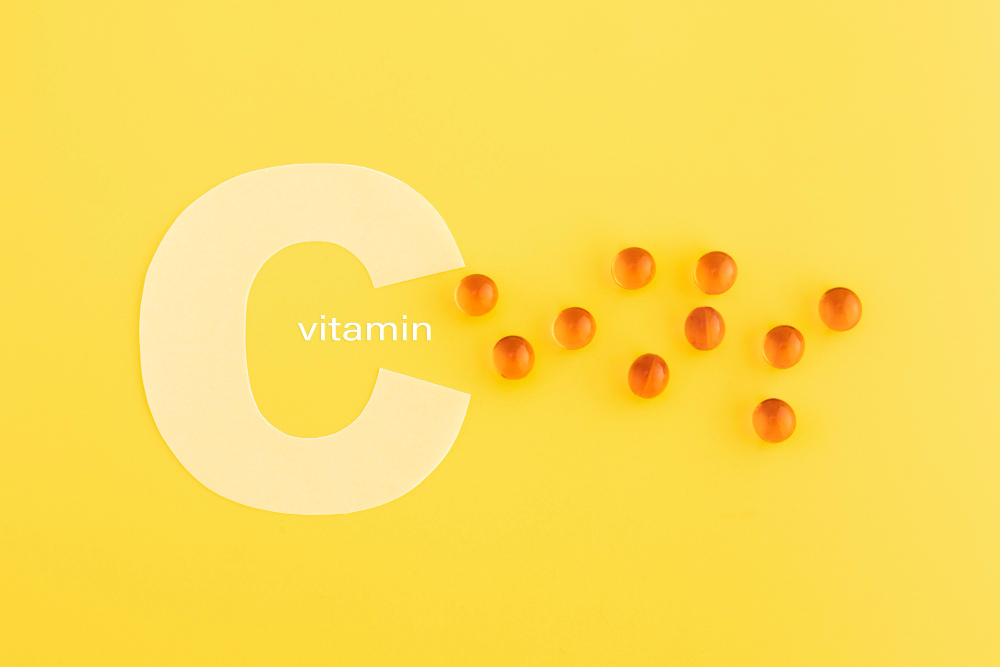Sodium ascorbate - properties, indications, dosage

Vitamin C, which we supply to the body, is not always in the form of L-ascorbic acid. An increasingly popular alternative is sodium ascorbate, the sodium salt of ascorbic acid. What properties does this compound have? How does it differ from L-ascorbic acid? In what situations it is worth supplementing it and in what dose?
What is sodium ascorbate?
Sodium ascorbate, found in the food industry under the name E301, is a popular acidity regulator added to food. Sodium ascorbate, known in the food industry as E301, is a popular acidity regulator added to food. Few people realize that ascorbate is actually nothing more than vitamin C.
Sodium ascorbate is an organic chemical compound that is formed as a result of the fermentation of glucose. It is in the form of a crystalline, white or yellowish powder that dissolves very well in water. Ascorbate is odorless. It has a mildly salty taste and a slightly alkaline reaction. Unlike L-ascorbic acid, it does not strongly irritate the mucous membranes of the esophagus and stomach.
Properties of sodium ascorbate
The use of sodium ascorbate is very wide. It is used primarily as a:
- stabilizer and acidity regulator in food,
- chemical reagent,
- strong antioxidant.
Sodium ascorbate is also a popular dietary supplement that supports the immune system, nervous system, cardiovascular system and can have a salutary effect on the condition of skin, bones and teeth.
Due to the fact that the reaction of ascorbate is less acidic than that of ascorbic acid, this compound is recommended for people suffering from a variety of gastrointestinal diseases. It is therefore recommended for people suffering from, among other things, heartburn and reflux.
Why is it worth using sodium ascorbate? The compound is characterized by high assimilation and bioavailability. What's more, sodium ascorbate has no irritant effect on tooth enamel. It does not accumulate in the body, and the excess is excreted in the urine.
Sodium ascorbate - contraindications
As the name suggests, sodium ascorbate contains significant amounts of sodium in its composition. Therefore, it is not recommended for people suffering from hypertension.
Properties of vitamin C
Sodium ascorbate is a buffered form of vitamin C with high assimilability and bioavailability. Regular consumption of sodium ascorbate supplements in the daily diet can therefore provide a range of health-promoting benefits without irritating the gastrointestinal tract.
Sodium ascorbate as a nutrient:
- neutralizes free radicals and protects cells from oxidative stress,
- reduces the feeling of fatigue,
- helps to maintain balance in biochemical processes,
- participates in collagen biosynthesis and provides beautiful skin,
- accelerates wound healing,
- supports the health of bones, teeth, cartilage and joints,
- seals blood vessels,
- Participates in the metabolism of cholesterol and bile acids,
- participates in fat metabolism,
- participates in the production of neurotransmitters,
- increases the absorption of iron,
- supports the proper functioning of the immune system,
- helps to get back in shape during convalescence and weakening of the body.
Recommended products
Who should take vitamin C?
The group of people who should reach for dietary supplements with vitamin C includes, first of all:
- young people,
- elderly people,
- immunocompromised people,
- people struggling with infection,
- people prone to sprains and bone fractures,
- people with vascular disorders,
- people who choose to engage in sports or work physically.
Due to its strong antioxidant and immune system-supporting properties, taking vitamin C is recommended especially during periods of reduced immunity. Sodium ascorbate is an antioxidant that can effectively eliminate heavy metals and toxins from the body.
Vitamin C deficiency
Vitamin C deficiency is most common in people who eat unhealthily. An inadequately balanced diet, poor in fruits and vegetables, promotes deficiencies of this component. The risk group mainly includes malnourished people, smokers, people with a reduced appetite, people struggling with eating or absorption disorders and people on a reduction diet.
How to recognize vitamin C deficiency? Depending on the person, it can manifest itself in very different ways, e.g. through mood deterioration, lethargy, decreased immunity or even anemia. Lack of adequate vitamin C in the body can also interfere with collagen synthesis, which can in turn lead to slower wound healing, inflammation of the gums or susceptibility to bruising and hemorrhaging.
Vitamin C - dosage
In adults, the recommended daily allowance of vitamin C is 1 mg per kilogram of body weight. When using sodium ascorbate, it is worth remembering that it also contains sodium (111 mg per 1,000 mg of ascorbate), so it provides a little less vitamin than pure ascorbic acid.
Dosage for a child
For children, the recommended daily allowance of vitamin C is double at 2 mg per kilogram of body weight. Vitamin C deficiency in children can cause: anemia, painful teething and bleeding gums.
High doses
The use of higher doses of vitamin C should always be done in consultation with a doctor. High doses of sodium ascorbate are not recommended for those suffering from urinary tract stones or struggling with excessive oxalate excretion by the kidneys.
Sources of vitamin C?
The human body does not have the ability to synthesize vitamin C on its own. Therefore, it is necessary to provide it in food or supplements in the form of sodium ascorbate or L-ascorbic acid. Vitamin C is found in many natural products.
The largest amounts of the vitamin can be found in fruits and vegetables, such as parsley, bell peppers, Brussels sprouts, kiwi, rosehips, acerola, strawberries, papaya and citrus fruits.
Pickles are also a very valuable source of vitamin C. During the transformations that occur during pickling, ascorbic acid is secreted, and the amount of ascorbic acid is much higher than in the product before processing.

Is it possible to overdose on sodium ascorbate?
Following the recommendations regarding the daily dose of vitamin C, it is almost impossible to overdose. In general, sodium ascorbate that is not absorbed is excreted in the urine within a few hours and does not accumulate in the body.
Attention! Using too high doses of sodium ascorbate should not be life threatening, but it can cause a number of side effects. These include nausea, vomiting, diarrhea, sleep disturbances, headaches, skin rashes, fatigue, fever, stones in the kidneys, weight loss, muscle aches, among others.
Dietary supplements containing vitamin C
Vitamin C-based supplements usually take the form of tablets, capsules, powder to dissolve in water or lozenges and may contain additional ingredients. Although most dietary supplements available on the market contain L-ascorbic acid, we should not have problems finding supplements with sodium ascorbate.
Sodium ascorbate enemas have also become increasingly popular in recent years. Vitamin C in this form allows to replenish deficiencies faster. It is especially recommended for people with sensitive stomach. The vitamin enema is well tolerated by the body and is characterized by very good bioavailability.
Sodium ascorbate is a highly absorbable vitamin C that will work well for most people. Ascorbate dissolves well in water, and does not irritate the mucous membranes of the digestive tract and tooth enamel. Taking ascorbate-based dietary supplements reduces the unpleasant discomforts that can occur after taking ascorbic acid.
Sources:
- https://pubchem.ncbi.nlm.nih.gov/compound/ascorbic_acid#section=Top
- https://pubchem.ncbi.nlm.nih.gov/compound/23667548
- https://ods.od.nih.gov/factsheets/VitaminC-Consumer/
- https://www.ncbi.nlm.nih.gov/pmc/articles/PMC5579659/
- https://www.ncbi.nlm.nih.gov/pmc/articles/PMC3783921/
- https://www.frontiersin.org/journals/nutrition/articles/10.3389/fnut.2021.805809/full
- https://ods.od.nih.gov/factsheets/VitaminC-HealthProfessional/#h19
- https://www.msdmanuals.com/home/disorders-of-nutrition/vitamins/vitamin-c-excess
